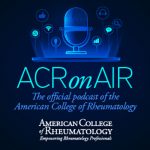Having met through Twitter, the doctors started the podcast in November 2012. They now have an estimated 500–600 listeners—not a legion, but Dr. Laccheo says it’s still a bit intimidating to think there are so many doctors listening in.
The Process
The doctors have never been in the same room all at once, Dr. Sufka says.
To do the show, all they really need is a microphone, Skype, recording software (even GarageBand on a Mac would work fine), and a quiet room. When recording, each doctor records his own voice locally in case there’s a problem with the Skype connection. Dr. Laccheo used to edit the show, but they’ve gotten a few sponsors and recently hired a professional editor for that.
Recent shows have included discussions on biologics, tofacitinib, ustekinumab and how turmeric might be helpful in osteoarthritis of the knee. They also throw in chit-chat about technology and anything else that might cross their minds.
“We use this as a way for us to learn, as well, and I think that’s how you keep it enjoyable,” Dr. Sufka says. “If this [is] something I would have to learn on my own, why not do it in public and help other people maybe pick something else up, too?”
Dr. Laccheo says a podcast is a great way to dissect new studies. “When a study comes out, it’s not just black or white,” he says. “We have to argue about the benefits, the risks. Do we think it’s a good study? Having that conversation is very important.”
A good podcast, he says, has to be a regularly produced show; it has to have good audio quality, and it has to both entertain and educate.
“Podcasting is very personal,” he says. “You introduce yourself. You’re talking to your audience. It’s like you’re sitting there having a conversation at a bar.”
“It’s got to be something that you want to keep listening to,” he says. “The moment when you’re listening to some great story on NPR, and you get home, and you stay in your car because you want to hear the end of that story; I think a podcast has to be same way. It’s got to be entertaining.”
The Buzz
For doctors “on the go all the time,” podcasts are a great option, says Chris Wright, MD, a rheumatologist in Houston and a devotee of The Rheumatology Podcast.
“Once it’s been published I can listen to it at any time, as many times as I like, on my schedule,” he said. “Podcasting is like translating the benefits of a cable DVR to audio entertainment.”


